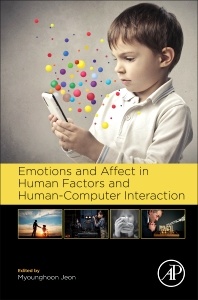Emotions and Affect in Human Factors and Human-Computer Interaction
Coordonnateur : Jeon Myounghoon

Emotions and Affect in Human Factors and Human?Computer Interaction is a complete guide for conducting affect-related research and design projects in H/F and HCI domains. Introducing necessary concepts, methods, approaches, and applications, the book highlights how critical emotions and affect are to everyday life and interaction with cognitive artifacts.
The text covers the basis of neural mechanisms of affective phenomena, as well as representative approaches to Affective Computing, Kansei Engineering, Hedonomics, and Emotional Design. The methodologies section includes affect induction techniques, measurement techniques, detection and recognition techniques, and regulation models and strategies. The application chapters discuss various H/F and HCI domains: product design, human?robot interaction, behavioral health and game design, and transportation. Engineers and designers can learn and apply psychological theories and mechanisms to account for their affect-related research and can develop their own domain-specific theory. The approach outlined in this handbook works to close the existing gap between the traditional affect research and the emerging field of affective design and affective computing.
Part I: Foundations of affective sciences 1. Emotions and Affect in Human Factors and Human–Computer Interaction: Taxonomy, Theories, Approaches, and Methods 2. Neural Mechanisms of Emotions and Affect 3. Mood Effects on Cognition: Affective Influences on the Content and Process of Information Processing and Behavior 4. Cross-Cultural Similarities and Differences in Affective Processing and Expression 5. On the Moral Implications and Restrictions Surrounding Affective Computing
Part II: Frameworks of affective sciences in human factors and human-computer interaction 6. Design and Emotional Experience 7. From Ergonomics to Hedonomics: Trends in Human Factors and Technology—The Role of Hedonomics Revisited 8. An Approach Through Kansei Science 9. Affective Computing: Historical Foundations, Current Applications, and Future Trends
Part III: Methodologies: introduction and evaluation of techniques 10. Affect/Emotion Induction Methods 11. Affect Measurement: A Roadmap Through Approaches, Technologies, and Data Analysis 12. The Role of Registration and Representation in Facial Affect Analysis 13. On Computational Models of Emotion Regulation and Their Applications Within HCI
Part IV: Applications: case studies and applied examples 14. Evolution of Emotion Driven Design 15. Affective Human–Robot Interaction 16. Computational Modeling of Cognition–Emotion Interactions: Theoretical and Practical Relevance for Behavioral Healthcare 17. Emotions in Driving
Part V: Emerging areas 18. Positive Technology, Computing, and Design: Shaping a Future in Which Technology Promotes Psychological Well-Being 19. Subliminal Perception or "Can We Perceive and Be Influenced by Stimuli That Do Not Reach Us on a Conscious Level?" 20. Physiological Computing and Intelligent Adaptation 21. Aesthetic Computing
Dr. Myounghoon “Philart Jeon is an Associate Professor in the Department of Cognitive and Learning Sciences and the Department of Computer Science at Michigan Tech and founding director of the Mind Music Machine Lab (https://sites.google.com/site/mindmusicmachinelab/). He also serves as a Director of the Center for Human-Centered Computing at the Institute of Computing and Cybersystems at Michigan Tech.
His research focuses on HCI (Human-Computer Interaction) and HRI (Human-Robot Interaction), including Auditory Displays, Affective Computing, Assistive Technologies, Automotive User Interfaces, and Aesthetic Computing. His research has yielded more than 150 publications across top peer reviewed journals and conference proceedings. His research is currently supported by NIH (National Institutes of Health), DOT (Department of Transportation), FRA (Federal Railroad Association), Hyundai Motors Company, Equos Research Co., LTD., and MTTI (Michigan Tech Transportation Institute), etc. At Tech, he teaches Affective Design and Computing, Human Factors, Human Factors II: Multimodal Design and Measures, Human-Robot Interaction, Human-Centered Design among others. He serves as an Associate Editor of MIT Press Journal, Presence: Teleoperators and Virtual Environments and Affective Design Technical Committee of International Ergonomics Association (IEA). He has recently guest-edited journal special issues in "subliminal perception" (Presence) and "social cars and connected vehicles" (Pervasive and Mobile Computing), "arts and aesthetics in VR (Presence), and "sonic information design" (Ergonomics in Design). He actively works in international conferences - chairing programs and sessions, organizing workshops, and serving as program committee in AutomotiveUI, ICAD, HFES, CHI, MobileHCI, UbiComp, PersuasiveTech, etc.
Dr. Jeon completed his MS and PhD degrees at Georgia Tech in Engineering Psychology and Human-Computer Interaction. His dissertation focused on the d
- Provides a theoretical background of affective sciences
- Demonstrates diverse affect induction methods in actual research settings
- Describes sensing technologies, such as brain–computer interfaces, facial expression detection, and more
- Covers emotion modeling and its application to regulation processes
- Includes case studies and applied examples in a variety of H/F and HCI application areas
- Addresses emerging interdisciplinary areas including Positive Technology, Subliminal Perception, Physiological Computing, and Aesthetic Computing
Date de parution : 04-2017
Ouvrage de 624 p.
15x22.8 cm
Thèmes d’Emotions and Affect in Human Factors and Human-Computer... :
Mots-clés :
affect; affect and processing strategies; affect congruence; affect detection; affect measurement; affect regulation; affection; affective artificial agents (AAAs); affective computing; affective measurement; affective sciences; affectivity; amygdala; appraisal; attention; automotive user interfaces; behavioral healthcare technology; body language; brain function; brain-computer interface; cognition; computational modeling; computational models of affective disorders and psychopathology; conceptual framework; conscious awareness; conscious experience; design; driving behavior model; dynamics; education; emotion; emotion detection; emotion driven design; emotion induction; emotion regulation; emotion-cognition modeling; emotional data; emotional design; emotional response; ergonomics; ethics; facial expressions; feelings; film; flow; Gabor filters; hedonomics; HRI; human factors; human information processing; human-computer interaction (HCI); human-machine interaction; human-robot interaction; imagination; individual differences; information overload; information processing; insula; intelligent adaptation; interaction; interaction design; kansei; kansei engineering; machine ethics; memory; modeling mechanism of therapeutic action; multimodal analysis; music; neuroergonomics; personal experience; physiological computing; physiological signals; physiology; pixels; positive computing; positive emotions; positive psychology; positive technology; prefrontal cortex; psychophysiology; receptivity; registration; representation; road rage; robotic systems; sensing technologies; sensors; simulation-based training; social robots; sound; spatial analysis; spatiotemporal analysis; subliminal perception; therapeutic games; transdiagnostic model; unconsciousness; understanding emotion; user experience; UX


